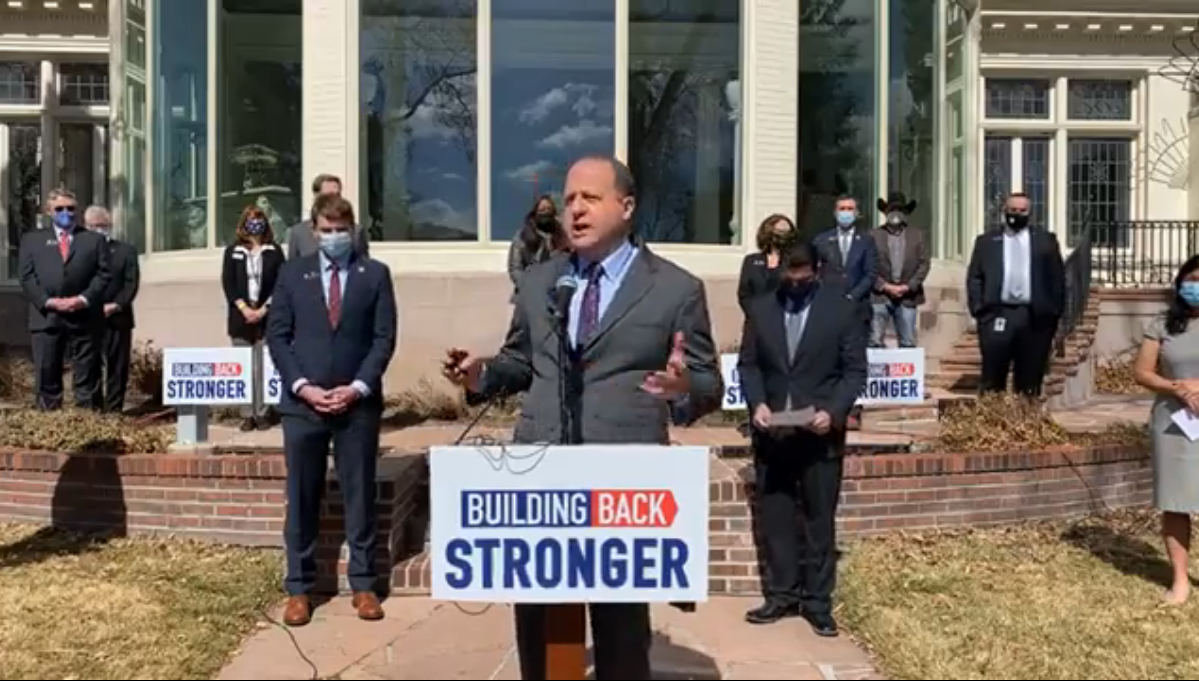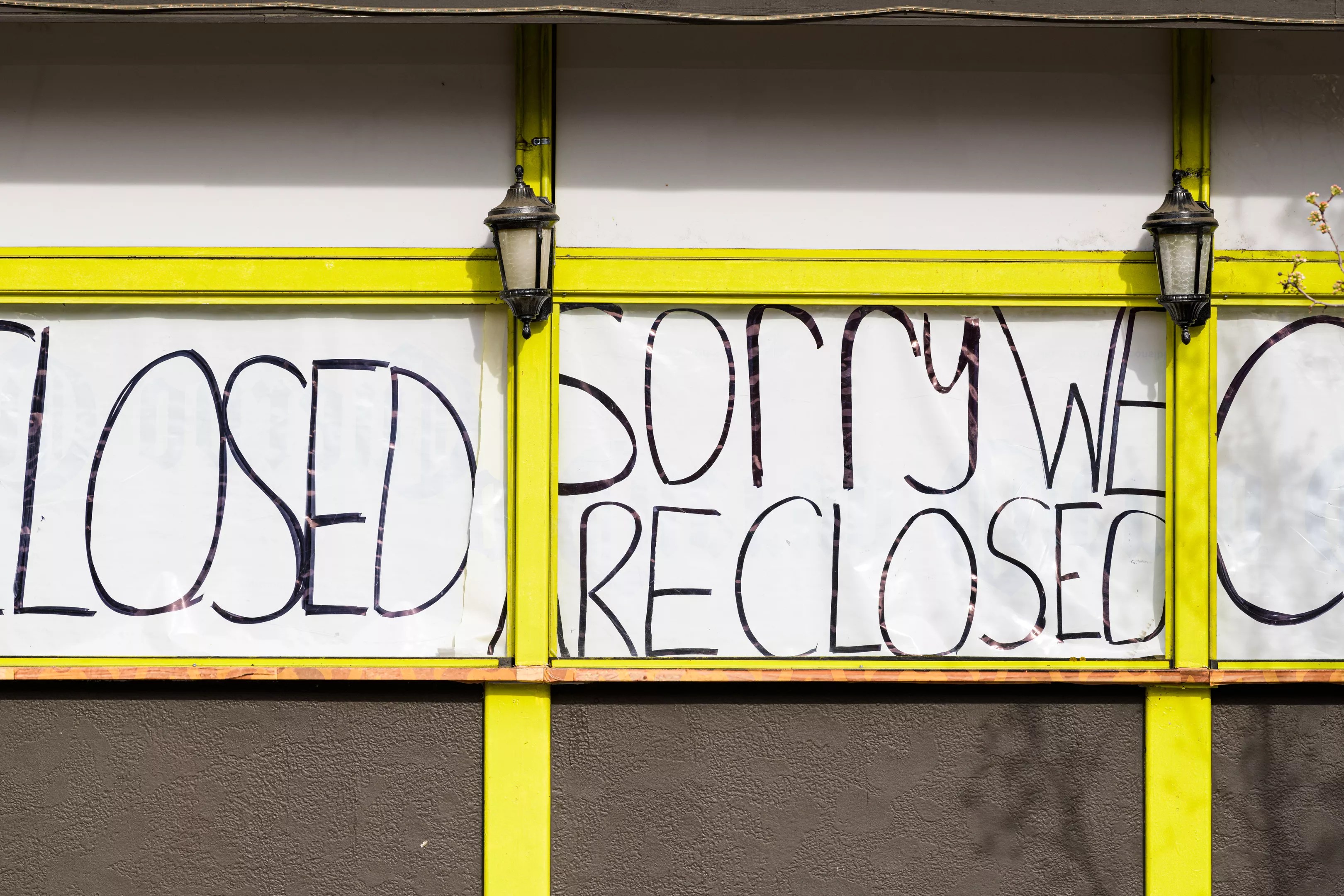
Still from Governor Jared Polis video conference

Audio By Carbonatix
On March 11, President Joe Biden signed the American Rescue Plan Act, creating relief programs and direct funds for individuals and businesses hit hard by the pandemic. Restaurants were specifically targeted this time (unlike in the CARES Act of 2020), with $28.6 billion allocated to the Restaurant Revitalization Fund. The fund, which will take the form of various-sized grants to chains as well as independent restaurants, comes at a time when the State of Colorado is also looking to make additional money available to small businesses.
On March 10, Governor Jared Polis held a press conference with a bipartisan group of Colorado legislators and business owners to announce that $700 million is being made available for a proposed stimulus package called the Colorado Recovery Plan. Polis said that the money is available in the budget now because last year “we were prepared for worse,” and officials were expecting “greater devastation to the state budget.”
The recovery plan is intended to strengthen small businesses with one-time funds that will be allocated over the next twelve to eighteen months, he explained, with no ongoing component after that. While the details have yet to be hammered out, two of last year’s programs are expected to continue: Colorado lawmakers hope to extend the “sales tax holiday,” which gave bars, restaurants and mobile food vendors a break from paying state sales tax from November 2020 through February 2021, and they also plan to give out more Energize Colorado small-business grants (which weren’t restaurant-specific).
“We were so pleased when Stacked Subs received a $15,000 grant from the Energize Colorado gap fund back in December,” said the two-location restaurant’s owner, Ann Koerner, during Polis press conference. “We’re proud to say we have not had to let go of a single team member.”
Beth Gruitch, co-owner of Rioja, Bistro Vendôme, Ultreia and Stoic & Genuine, noted that she and her business partner, Jennifer Jasinski, closed their fifth restaurant, Euclid Hall, at the beginning of the pandemic, but added that prospects are improving because of recent measures. “We appreciate the governor’s recent focus on the loosening of restaurant restrictions where possible and looking at creative ways to support small businesses,” said Gruitch, who’s also chair-elect of the Colorado Restaurant Association. “The restaurant sales tax relief will enable restaurants and bars such as ours to retain the sales tax reserves instead of remitting the funds to the state. This is incredible for us…the relief makes sure that restaurants don’t have to choose between paying taxes or keeping employees.”

Restaurants all over the state need help to keep from closing.
Ethan Herrold
The Colorado Restaurant Association has been polling member and non-member restaurants for the past year to determine how the pandemic and the resulting restrictions have affected the industry. The association notes that the food-service industry collectively lost more than $3 billion in revenue last year and is down 94,000 jobs year over year. “Restaurants will not even begin to recover until they’re back at 100 percent [capacity],” says Sonia Riggs, the CRA’s president and CEO, so the federal and state relief comes at a crucial time. “We expect the recovery to take three to five years.”
The CRA and its overarching organization, the National Restaurant Association, have been working with elected officials at both the state and federal level to pass legislation providing direct relief (including the Restaurant Revitalization Fund) and to give food-service operators more ways to generate revenue while restrictions continue. One Colorado bill that the CRA is backing would provide a five-year extension to the current to-go liquor law that’s set to expire in June, which allows restaurants and bars to sell properly packaged beer, wine and spirits for takeout and delivery. Other programs include the extension of expanded outdoor seating and a permanent ban on the ability of third-party delivery companies to offer menus of restaurants that have not given permission to do so.
The day after Polis’s press conference, Riggs announced that Tuesday, March 16, is Dine Out to Help Out Day across the state; it’s designed to encourage Coloradans to get food to go, dine at a restaurant, or grab booze, gift cards or meal kits from eateries offering them. It’s also a day to contact your federal, state and local officials to voice your support for restaurant-specific legislation and assistance. Visit the Dine Out to Help Out website to find a list of restaurants searchable by services offered, ranging from outdoor dining to batched cocktails to online classes.